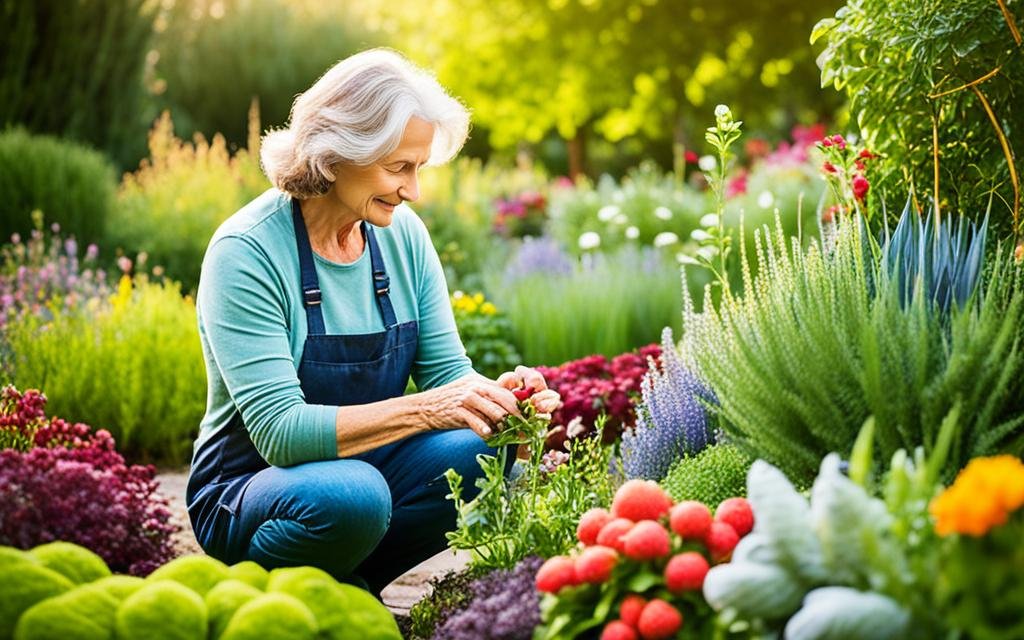As the days get longer, Mental Health Awareness Month meets gardening season’s peak in Western PA. This creates a special bond. Working in the garden, listening to birds, and breathing fresh air are healing. Have you thought about how seasonal gardening can soothe the mind all year round? It gives us a break from our busy lives, bringing calm moments every day.
Your garden stands as proof: just as plants reach for the sun, we can also grow. Caring for your garden is like a moving meditation. Studies show the pandemic made many turn to gardening for comfort and a sense of purpose1. Another study found that gardening can burn as many calories as a tough workout, helping both body and mind1. Picking your veggies brings not only fresh food but also joy and a feeling of achievement2.
In your garden, as plants grow, you also care for your mind and peace. The sun’s warmth suggests your heart rate and muscles can relax1. Gardening is a way of life that brings lasting happiness. It connects people, helping to prevent loneliness and maintain mental health2.
If you’re feeling stressed, start small with gardening to find peace1. Join others who also find comfort in gardening and build a support network1. By choosing the right plants for your area and sharing stories, your well-being will grow with your garden2.
Key Takeaways
-
- Engaging in seasonal gardening aligns with natural cycles for improved mental and emotional well-being.
- Gardening’s physical activity can be as beneficial as traditional exercise, promoting a healthier lifestyle.
- Nurturing a garden can lead to healthier eating habits and a deep sense of satisfaction.
- Tending to a garden fosters mindfulness, contributing to reduced stress and anxiety.
Just like a garden, social connections need nurturing; gardening provides this opportunity, enhancing mental health.
- Starting small and connecting with a community of gardeners offer support and increase the likelihood of a rewarding experience.
- Choosing appropriate plants for your areas leads to a more successful and therapeutic gardening experience.
The Therapeutic Power of Garden-to-Table
Embracing the garden-to-table lifestyle is rewarding and boosts your health. Through gardening, you do more than grow plants; you develop a healthy lifestyle. With homegrown foods, you enjoy the freshest nutrients that are essential for your brain and energy3.
Benefits of Homegrown Nutrients
Being in the garden means more sunlight and Vitamin D, which are vital for your bones and immune system. Gardening reduces stress and makes you happier by releasing endorphins4. Foods like tomatoes and greens grown at home are tastier and more nutritious, lowering chronic disease risks5.
From Garden to Plate: A Journey of Wellness
Moving fresh food from the garden to your plate brings joy and mental health benefits. Gardening connects you with nature, improving your well-being. Your own garden can be a peaceful escape and a creative space4.
Seasonal Vegetiles Enhancing Mental Health
Eating seasonal veggies like squash and carrots boosts your mental health. For example, spinach’s magnesium can fight depression. Regular gardening and eating pesticide-free food balance your mood and sharpen your mind35.
Let’s compare the nutrients in homegrown versus store-bought vegetables:
| Vegetable | Nutrients Homegrown (per 100g) | Nutrients Store-Bought (per 100g) |
|---|---|---|
| Tomatoes | 18 kcal, 1.2g protein, 24mg Vitamin C | 16 kcal, 0.8g protein, 19mg Vitamin C |
Nature’s Rhythm: Gardening Through the Seasons
Gardening with nature’s rhythm is rewarding and can improve your mental health, especially if you have seasonal affective disorder (SAD)6. By understanding Earth’s tilt and seasonal shifts, you can grow personally and live sustainably6.
Tips for gardening with the seasons show how matching your activities to the season can make you happier. Studies find gardening strengthens your bond with nature, making you feel grateful and happy7.
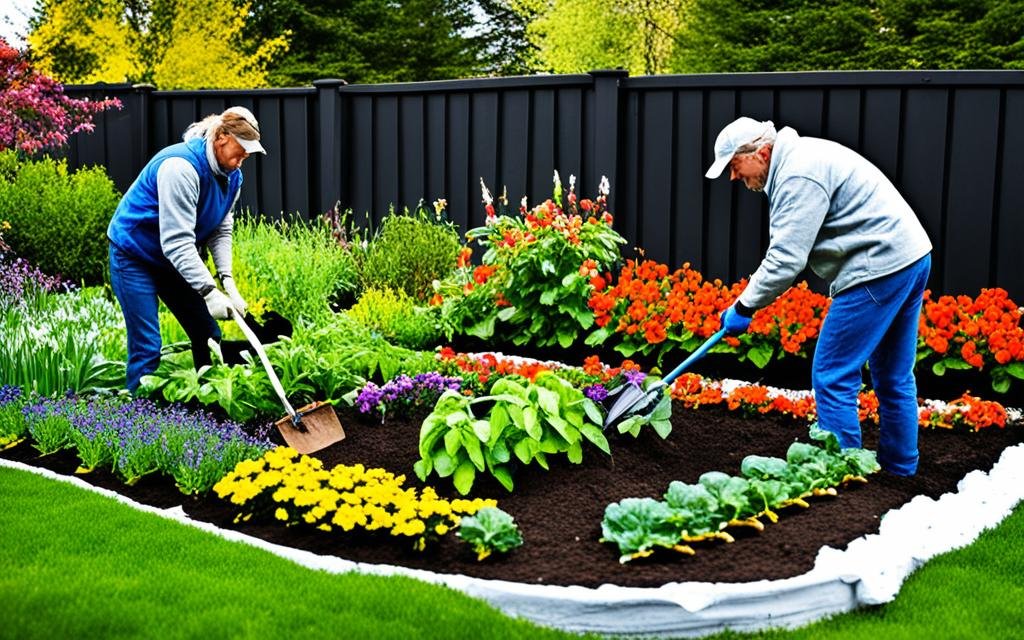
Gardening each season lets you eat fresh, seasonal food, which is good for your body and the planet6. Eating seasonally helps the environment by lowering the need for out-of-season produce, which is hard to grow and ship without using a lot of resources7.
| Season | Gardening Activity | Mental Wellness Benefit |
|---|---|---|
| Spring | Planting new seeds | Renewal of energy and optimism |
| Summer | Tending and nurturing growth | Enhancement of mood and vitality |
| Fall | Harvesting and preparing beds for winter | Feeling of accomplishment and preparation |
| Winter | Planning for next season’s garden | Maintaining engagement and preventing SAD6 |
Seasonal Gardening Tips for a Serene Mind
Gardening makes your environment beautiful and improves your mental health. Working with soil and plants offers a break from daily life. Discover how each season aids your mental health with specific gardening tips.
Winter Blues to Lush Greens: Overcoming SAD
Winter may seem slow for gardening, but activities like winter sowing and indoor gardening boost your mood. These tasks remind us of growth and fighting Seasonal Affective Disorder (SAD). Studies show that being around plants, even inside, lifts your mood and energy8.
Spring Renewal: Planting Seeds of Happiness
Spring brings new starts. Planting seeds marks new beginnings and joy as they grow. Planting connects you to nature and boosts your happiness as the world wakes up9.
Summer and Sun: Cultivating Joy and Vitamin D
Summer brings sun and the chance to grow joy and get Vitamin D. Gardening outside increases vitamin D, which can help with mood swings and mental health10.
Fall Harvest: Reaping Mindfulness and Gratitude
In fall, you harvest what you’ve grown. It’s a time for mindfulness and thankfulness for nature’s gifts. Harvesting reflects on cycles and personal growth, bringing peace and pride10.
Also, mixing the right plants and seasonal tactics impacts mental well-being. Handling soil, with its good bacteria, boosts serotonin. This lowers anxiety and clears your mind8.
| Season | Activity | Benefits |
|---|---|---|
| Winter | Indoor Gardening | Improves mood, combats SAD |
| Spring | Planting New Seeds | Renews happiness, fosters optimism |
| Summer | Outdoor Gardening | Boosts Vitamin D, cultivates joy |
| Fall | Harvesting | Encourages mindfulness, gratitude |
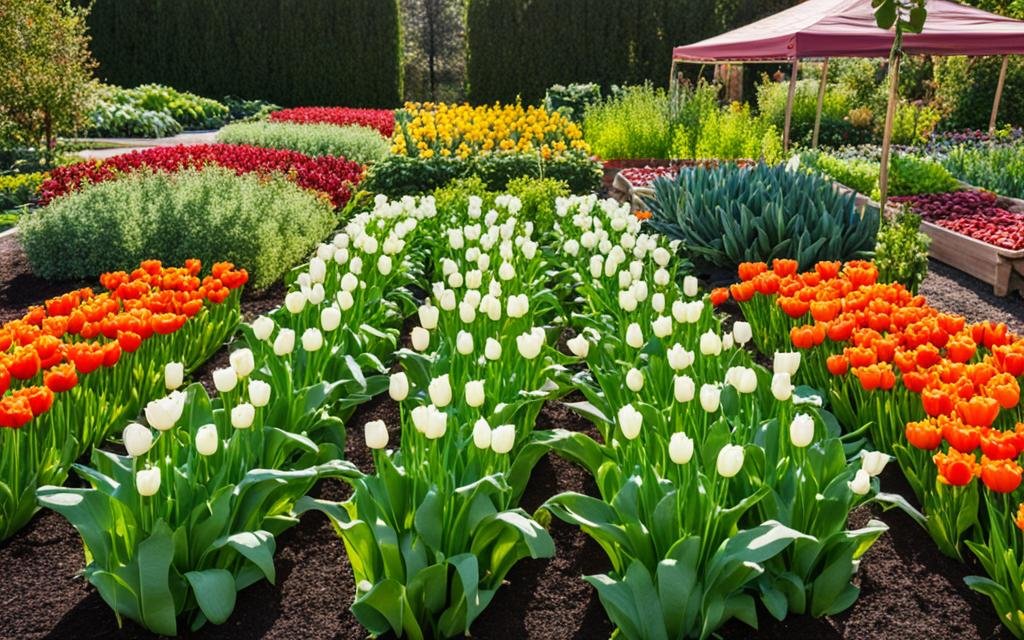
Cultivating Peace: Mindful Garding Practices
Transform your garden into a sanctuary for mental wellness through mindful gardening. Including a variety of plants can nourish your senses and boost your mental health. Trees are especially powerful in reducing depression, anxiety, and negative feelings11.
Add bamboo trees for privacy and create a secluded spot. A medium-sized tree can offer comforting shade11. Add fluffy hydrangeas and mounding plants for a soft, lush look11.
Involve your olfactory senses by adding fragrant plants like lilacs, roses, and lavender. Include aromatic herbs like rosemary and mint. These scents support mental wellness11. Also, include berries and citrus plants like oranges and lemons. They please the palate and add to your garden’s therapeutic benefits11.
For a peaceful atmosphere, add gentle sounds to your garden. Water features or wind chimes can bring calming sounds11. These elements connect you with nature and improve your mental well-being.
| Element | Benefits | Examples |
|---|---|---|
| Flowering Plants | Boost mood, visual appeal | Helenium, Narcissi, Rudbeckia12 |
| Trees | Reduce anxiety, improve air quality | Bamboo for privacy, Medium-sized for shade11 |
| Scented Plants | Stimulate senses, enhance calm | Roses, Jasmine, Lavender11 |
| Edible Plants | Engage taste, nutritional value | Berries, Citrus plants11 |
| Auditory Features | Calming sounds, stress relief | Water features, Wind chimes11 |
Choose and place these elements wisely to make a mindful garden. Make each visit a step toward peace and connection with nature.
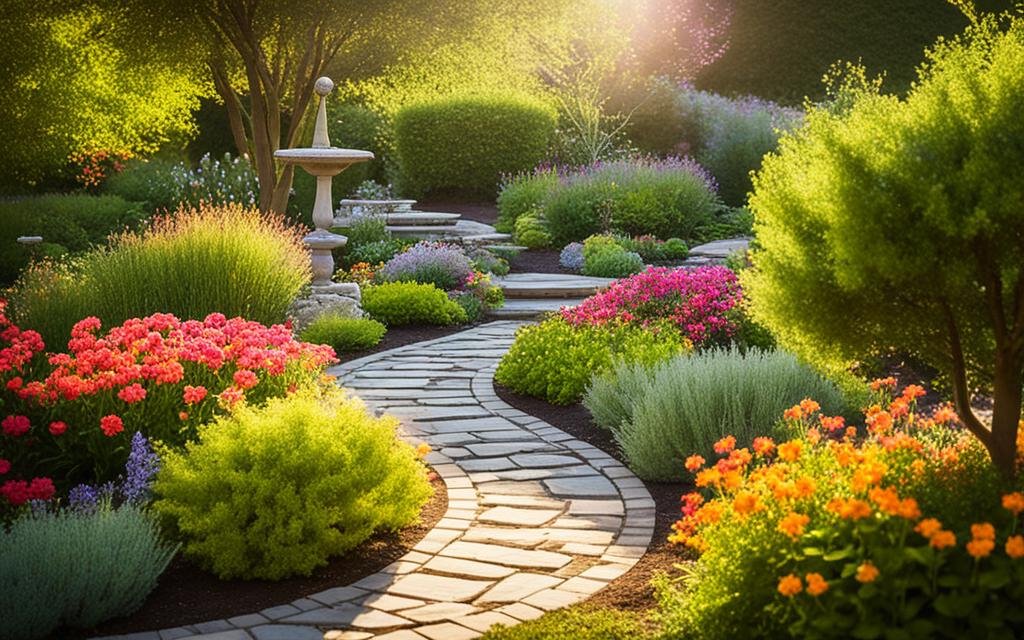
Mental Wellness Through Seasonal Garden Activities
Gardening is more than just looking after plants. It’s a journey of mindful gardening that brings us mental peace. It works like horticultural therapy. Beyond the physical work, it helps in releasing stress and emotions, valuable for mental health throughout the year.
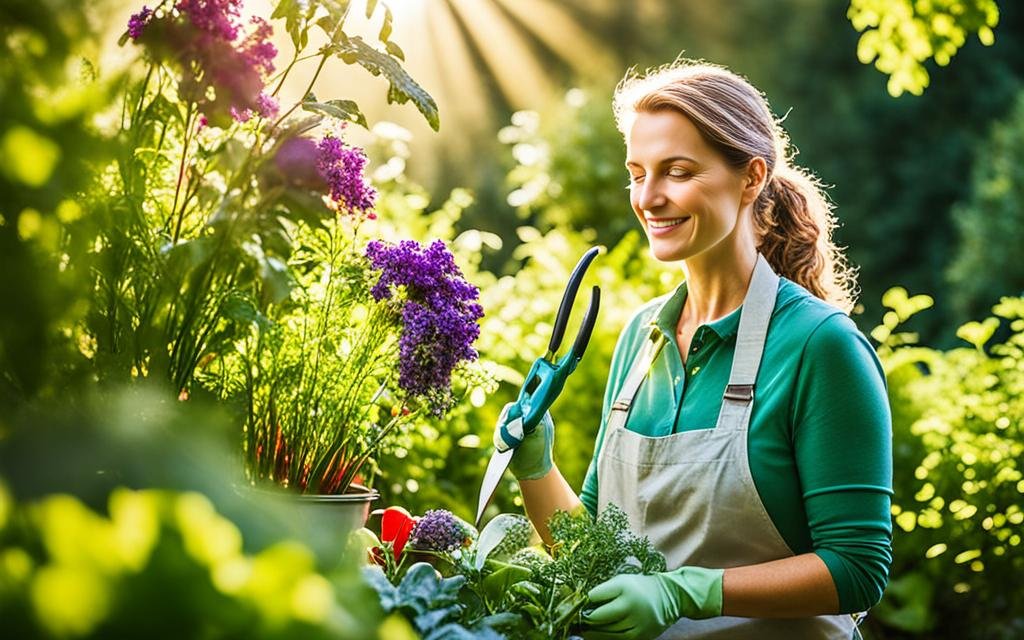
Mindful Gardening as Horticultural Therapy
Planting, watering, and caring for a garden transform us. It creates a space for mindfulness and better emotional health. Charles Hall, Ph.D.’s research shows gardening reduces anxiety, boosts memory, and can even help with PTSD13.kk>. By connecting with the earth in repetitive tasks, we feel more present. This helps lower emotional ups and downs and teaches us to enjoy life’s growth14.kk>.
Engaging the Community: Social Aspects of Gardening
Gardening boosts more than just our own mental health. It also connects us with others. Working in a community garden or with the Junior Master Gardener, we grow more than plants. We build relationships and strengthen our community ties. These activities lessen loneliness and make everyone feel more supported14.kk>. The Texas A&M AgriLife Extension Service combines gardening with health and wellness. It shows how gardening improves social bonds and community health13.kk>.
| Benefit | Type of Gardening Activity |
|---|---|
| Stress Reduction | Watering and weeding |
| Increased Creativity and Productivity | Designing garden layouts |
| Social Engagement | Participating in community gardening |
| Mindfulness and Presence | Cultivating and harvesting |
Connecting With Nature for Emotional Equilibrium
Have you ever wanted to escape to nature to feel better? Gardening wraps you in nature’s calm, helping reduce stress and anxiety. It’s a direct way to feel connected with the world around you.
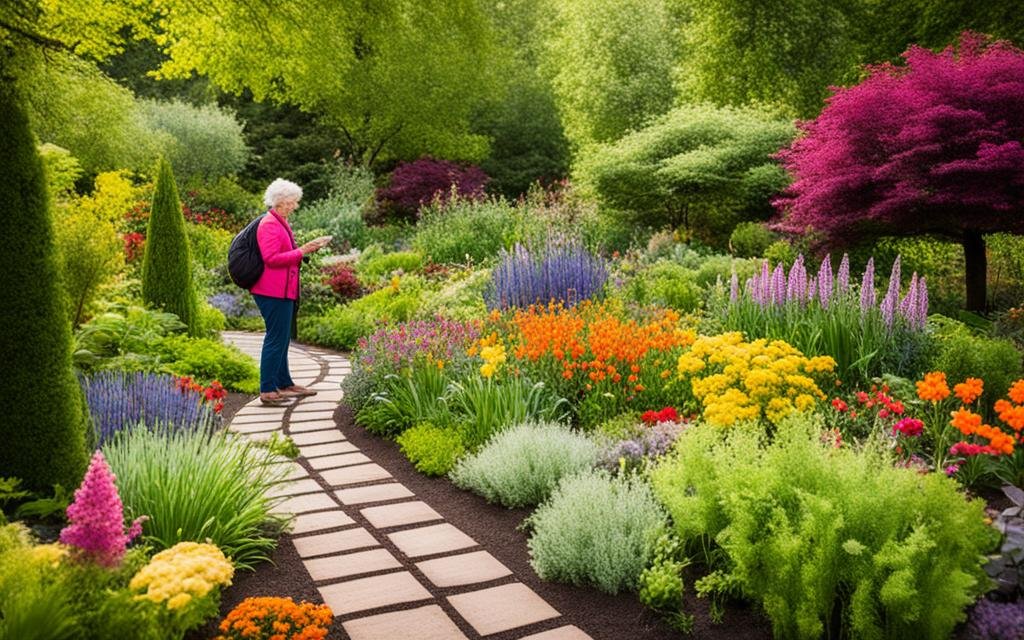
Gardening as a Sensory Experience
Gardening surrounds you with nature’s beauty. You feel the earth, see vibrant flowers, and smell fresh herbs. These experiences relax the mind and brighten your mood15.
The sounds of birds and rustling leaves add to this experience. They strengthen your bond with nature and bring inner peace15.
A Natural Escape: Reducing Anxiety and Stress
Gardening can lower stress and anxiety. Being around greenery decreases cortisol levels, boosting happiness and well-being16. Staying active in the garden fights off mental health issues. It promotes mindfulness and helps you stay in the moment1716.
This ‘green exercise’ improves mood and brain function. It shows that gardening is not just a hobby. It’s key to a healthy, balanced life17.
Caring for plants makes you feel proud and connected to nature. It helps you find emotional balance. So, when life gets too much, let your garden be your peaceful retreat.
Physical Health Benefits: The Side Effects of Gardening
Gardening is more than planting. It’s a way to improve your health. Doing garden work exercises your body and calms your mind.
Gardening gets you moving by having you bend, stretch, and walk. This boosts muscle strength, balance, and flexibility. These activities up your daily exercise, helping with weight and heart health. Gardening can also lower stress and make you feel better18.
Gardening also boosts your mood with a dopamine surge, making you happier19. Eating what you grow makes your diet healthier. It also reduces the risk of heart disease and other chronic illnesses18.
Gardening regularly cuts down heart disease and stroke risk by up to 35%. It’s a strong reason to include gardening in a healthy lifestyle18.
For the best health benefits, warm up before gardening to avoid injury. Use the right tools for a safer and more enjoyable experience19.
Gardening with others can also improve your social life. It helps build community bonds. These connections are key to feeling emotionally and mentally well18.
Enjoy the peace and joy gardening brings. Remember, it’s good for your body and mind.
Seasonal Adjustments for a Year-Round Garden
To keep your garden alive all year, you need to get good at seasonal changes. Following a seasonal planting guide is key. It tells you when to plant so that frost-resistant plants survive the cold. And heat-tolerant plants can make it through the hot summer.
Climate Adaptation and Plant Selection
Adapting to the climate means watching the weather closely and acting on it. For example, using drought-resistant plants cuts down on water use during dry periods. Choosing plants that withstand cold keeps your garden lively in winter. This way, you save on resources and keep your garden productive all year.
Knowing what plants need in each season lets you pick the right ones to grow. Adding evergreens, for instance, keeps your garden green during the cold months20.
Indoor Gardening and Greenhouse Cultivation Tips
Growing plants inside or in a greenhouse lets you garden all year. These places let you control the weather inside, helping plants grow even when it’s too cold or hot outside. Greenhouses are great for keeping plants safe from frost, allowing tender plants to grow any time of the year.
Indoor gardens can have edible plants like herbs and small veggies, not just pretty ones. They make your home look nice and give you fresh food all year. Using grow lights and keeping the air moist helps your indoor garden do even better.
| Season | Outdoor Planting Suggestions | Indoor/Greenhouse Planting Suggestions |
|---|---|---|
| Spring | Tomatoes, Peas, Spinach | Herbs (Basil, Parsley), Lettuce |
| Summer | Cucumbers, Bell Peppers, Zucchini | Chilies, Strawberries |
| Fall | Kale, Carrots, Beets | microgreens, Arugula |
| Winter | Frost-resistant varieties like Cabbage | Indoor Citrus trees, Dwarf banana plants |
If you follow these tips, your garden will be healthy and full of life all year. You’ll also be better prepared for changes in the weather. This means a beautiful garden that brings joy throughout the year21.
Designing a Garden That Grows With You
Starting your garden journey means mixing looks and usefulness with spots for calm minds and activity. It’s all about making an area that fits your health needs and helps your mind stay clear. This blend of beauty and utility, art and science, makes for a perfect garden space222324.
Aesthetic Considerations for Mental Clarity
Getting mental peace from your garden starts with your design choices. Choose plants for their bright colors, unique textures, and smells. This makes your garden a place that calms anxiety and helps you relax. Studies find gardening can really cut down stress2423. Changing up your garden with the seasons adds to the calm.
Also, the garden’s layout and things like fountains or statues can make it even more peaceful. This turns your garden into a place where your mind can clear23.
Creating Spaces for Movement and Meditation
Adding spots for exercise in your garden boosts both body and mind health. Places for yoga or stretching let you enjoy being active outdoors. This not only improves fitness but also makes you feel happy thanks to endorphins23. Plus, working in your garden can be a calm, mindful activity.
Setting aside parts of your garden for quiet or meditation is key for calm and focus. Design these spots with natural elements to connect deeply with nature. They help cut down on stress and increase peace23.
| Feature | Benefit | Role in Wellness |
|---|---|---|
| Colorful plant selection | Visually stimulating | Reduces feelings of stress and depression23 |
| Water features | Soothing sounds | Increases calm, reduces anxiety23 |
| Movement areas | Encourages physical activity | Releases endorphins, boosts mood23 |
| Meditation zones | Enables mental focus | Promotes mindfulness, enhances relaxation23 |
Conclusion
Gardening and mental health connect in special ways, bringing many benefits. Gardening gets us moving, which is great for our health. It also helps our minds by forming a bond with nature25. This reduces stress and improves mental health.
When we garden, it’s not just plants that grow, but we do too. Gardening helps fight depression and can mean less need for medicines. It brings people together, helping those with long-lasting mental health issues25. Plus, spending time outdoors, like in gardens, boosts our overall health if we do it for 120 minutes a week26.
In tough times, like the recent pandemic, gardening has been a big help. It has made people happier and more stable. This shows how powerful gardening can be in helping us handle stress and feel better26.
Let’s let gardening inspire us to add more green to our life. Public gardens or our own little green space can make a difference. Plants like jasmine and lemon balm can make us feel less anxious and more at peace27.
Every season, our gardens and mental health can bloom. Our success in gardening mirrors the richer life we can have. By taking care of our gardens, we also look after our minds and spirits.
Additional Resources and Further Reading
If exploring the blend of gardening and mental wellness interests you, there are many therapeutic gardening resources available. Places like The King’s Fund and initiatives like the Ornamental Roundtable Health and Horticulture are leading the way. They bring together gardening and health sciences. This partnership leads to research and sharing of knowledge. It involves the RHS Science Team and many universities in the UK and the USA28. This work shows how the design of gardens and the plants we choose can deeply affect our senses and well-being28. If you want to use this knowledge, “RHS Your Wellbeing Garden: How to Make Your Garden Good for You” is a great guide. It shows how to make your outdoor space a healing place for body and mind28.
Reading about gardening for mindfulness literature can introduce you to new and exciting activities. Imagine spending your winter doing activities that bring peace and joy, both inside and out. Picture yourself going on walks to notice the small details, making ice sculptures with plants, or writing about nature. All these are things you can find in winter wellbeing calendars29. These activities help you connect with the quiet beauty of nature in winter. They offer a chance to think and relax during the colder, sometimes tough, months29. Also, things like starting an indoor herb garden or watching birds can add simple joys to your day. They help you feel a part of the natural world’s changing seasons29.
For those wanting to find others who love gardening for mental wellness, there are many options. Local gardening groups, workshops, and online forums are wonderful for sharing stories and getting support. These places also offer a way to learn about proven gardening methods that can boost your mood. Being part of a community like this can deepen your understanding and love for gardening’s healing effects. So, why not join the many who find solace
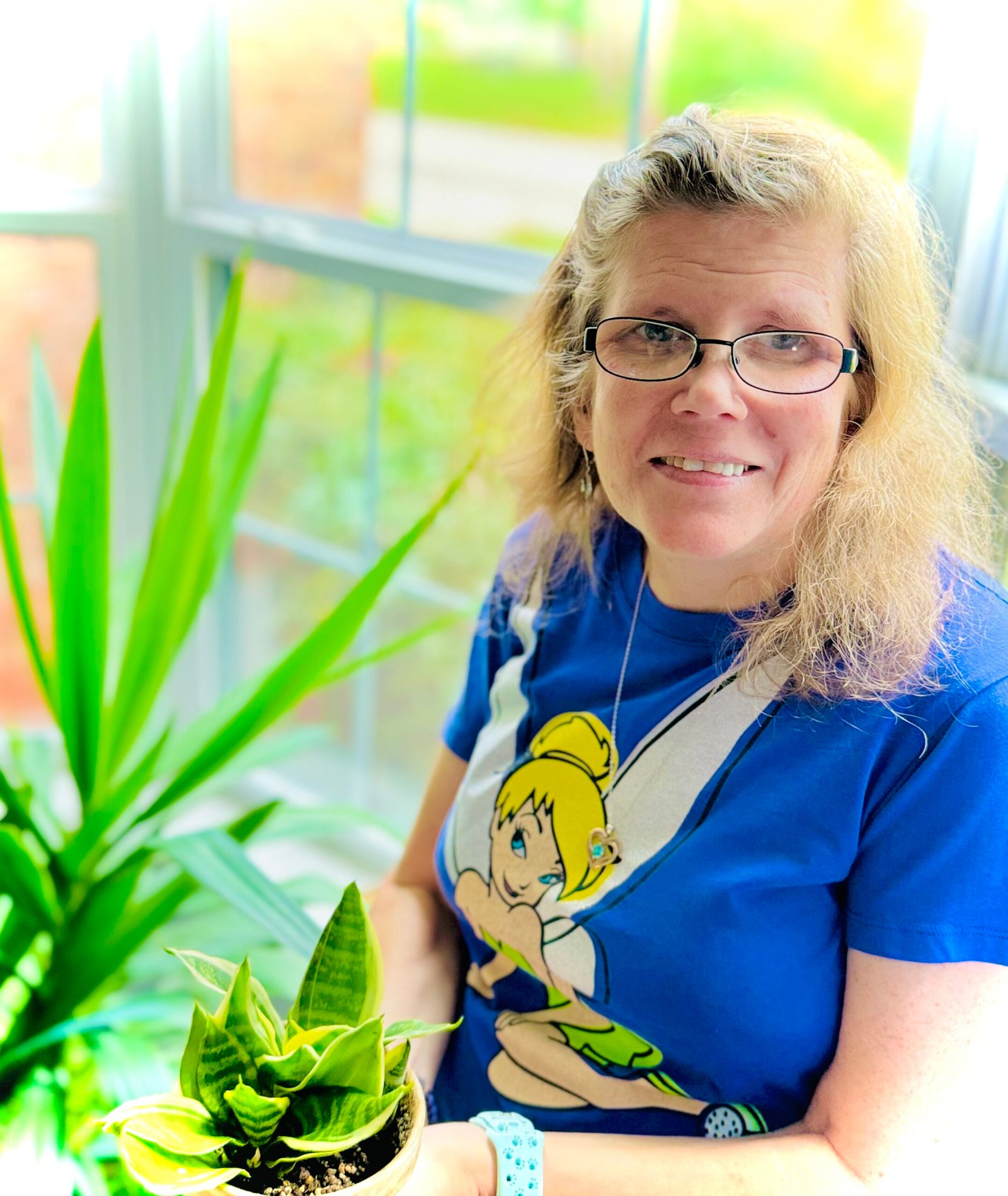
My name is Michelle Warren, and I’m the founder of Peaceful Gardening. As a 10-year breast cancer survivor, I’ve discovered the profound therapeutic power of gardening. This journey has not only helped me recover but has also become my passion and a source of ongoing peace and joy.
Peaceful Gardening was born from my desire to share the healing benefits of gardening with others. Whether you’re facing health challenges, dealing with stress, or simply looking to connect more deeply with nature, this space is for you.
Over the past decade, I’ve cultivated not just plants, but a deep understanding of how gardening can positively impact mental health. I’ve worked with local community gardens, led workshops on mindful gardening practices, and collaborated with mental health professionals to develop gardening-based stress reduction programs.
Peaceful Gardening was born from my desire to share the healing benefits of gardening with others. Whether you’re facing health challenges, dealing with stress, or simply looking to connect more deeply with nature, this space is for you.
Here, you’ll find evidence-based advice on using gardening as a tool for mindfulness, stress relief, and emotional healing. I share personal stories, practical tips, and scientifically-backed information on how to create your own therapeutic garden space, no matter the size of your yard or balcony.
My mission is to help you discover the joy, peace, and healing that comes from nurturing plants and connecting with nature. Join me in exploring how the simple act of tending to a garden can transform your mental and emotional wellbeing.
Welcome to Peaceful Gardening – let’s grow together towards better mental health!”

